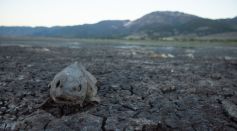ENVIRONMENT & CLIMATE

Species Can Experience Extinction Twice Before They Completely Go Extinct

Half Male, Half Female Stick Insect Discovered, The First Reported Dual-Sex of Its Kind

Can A Planet Think On its Own? Planetary Intelligence May Tackle Climate Change

Untrained, ‘Unenculturated’ Orangutans Use Hammer, Sharp Stones to Access Food Reward; First Cutting Behavior Observed

33ft-Long New Species of Dinosaur That Looked Like A Crocodile and Constantly Grew Teeth Discovered in Portugal

Tonga Volcano Eruption Created Almost 590,000 Lightning Strikes For 3 Days That Nearly Swallowed Neighboring Islands in the Archipelago

Rare Ghost Shark Hatchling Discovered at A Depth of 1200M on Chatham Rise, New Zealand

Male Humpback Whale Travels 6,000 Kilometers Between Mexico and Hawaii Chasing Single Females

Ancient Winged Plant Fossil May Solve ‘Paleobotanic Mystery,' How Plants Were Dispersed 100 Million Years Ago

Hundreds of Migratory Birds Simultaneously Died Above the Sky of Mexico in a Mysterious Event

Current Mega-Drought in the US Exceeded the One That Occurred in the 1500s

6 Mummified Peruvian Children Believed to be Sacrificial Escort to Dead Nobleman to the Underworld

300-Year-Old Linen Bedsheet Embroidered with Human Hair from a Severed Head Will Be Displayed in London

Armless But Skilled Dinosaur Captures Prey Using Head and Jaws, New Study Says
Most Popular

Can the World Run Out of Water? Water Scarcity Science and Climate Impact Explained

Solar Maximum 2026: Inside the Sunspot Cycle and Solar Activity Forecast Astronomers Are Watching

Volcanic Warning Signs: How Magma Movement Reveals Eruption Prediction Clues for Geologists

How Tsunamis Form and Travel at Extreme Speeds: Seismic Waves and Coastal Hazards





